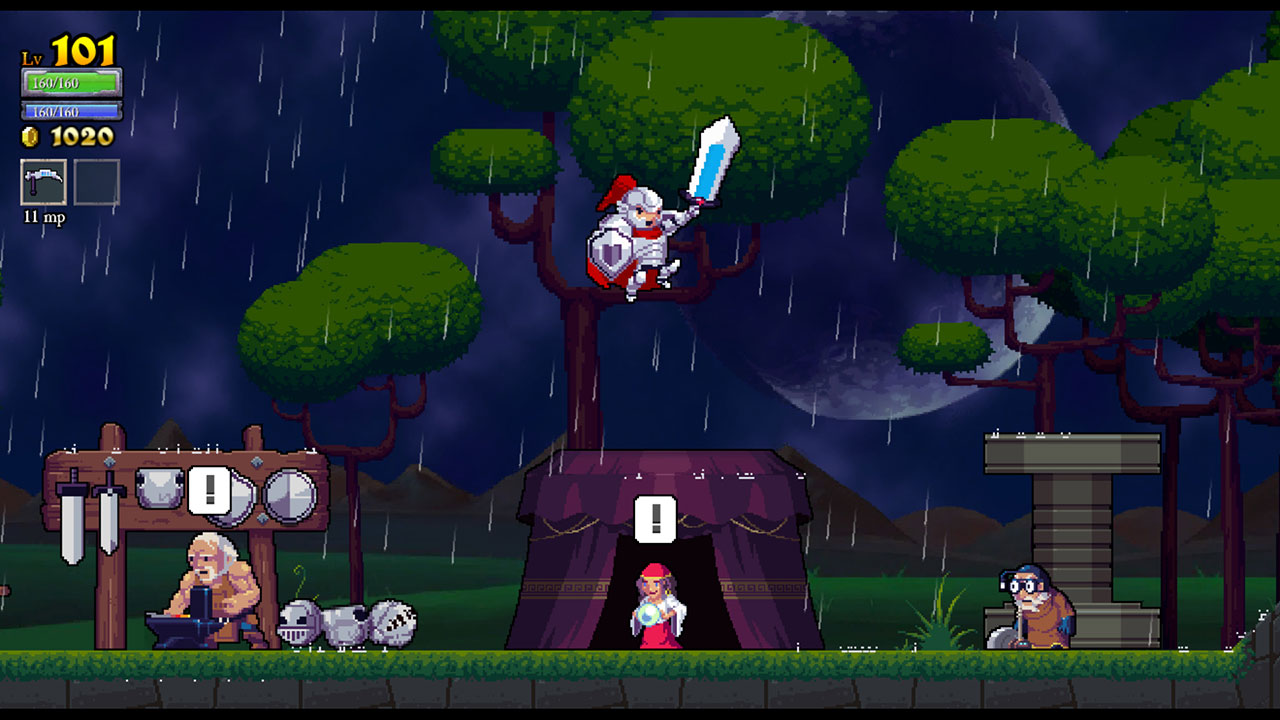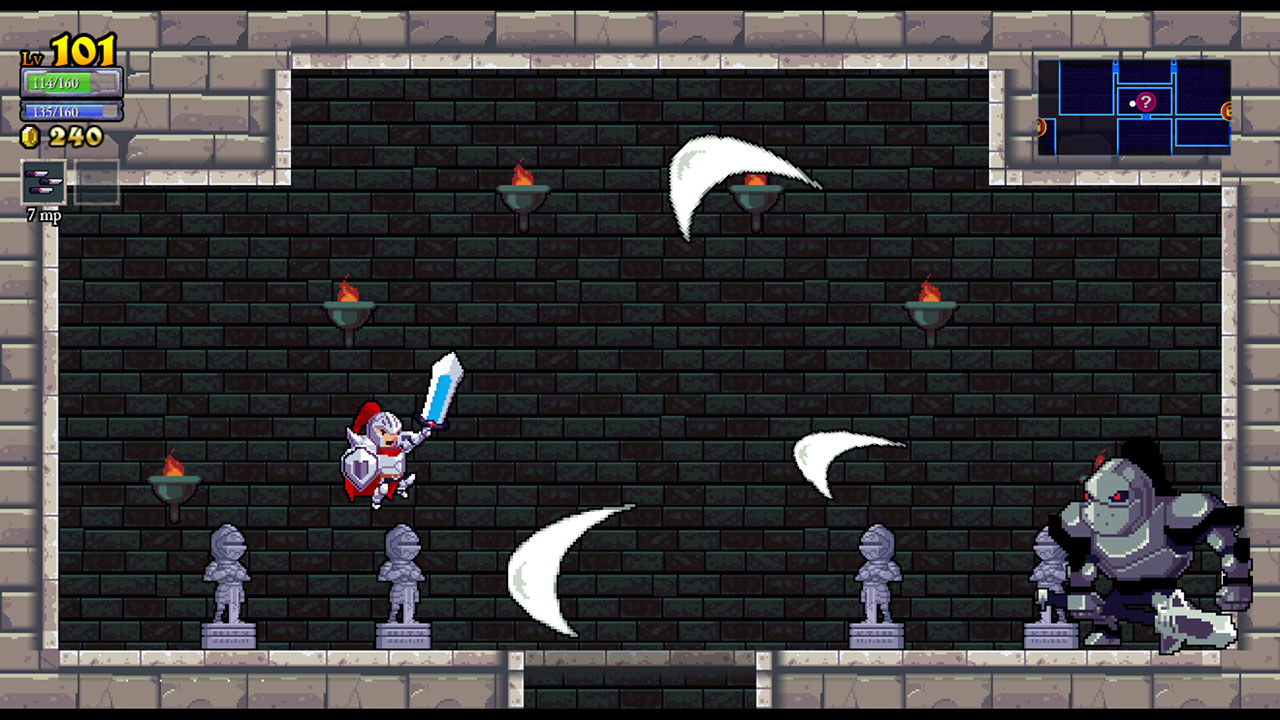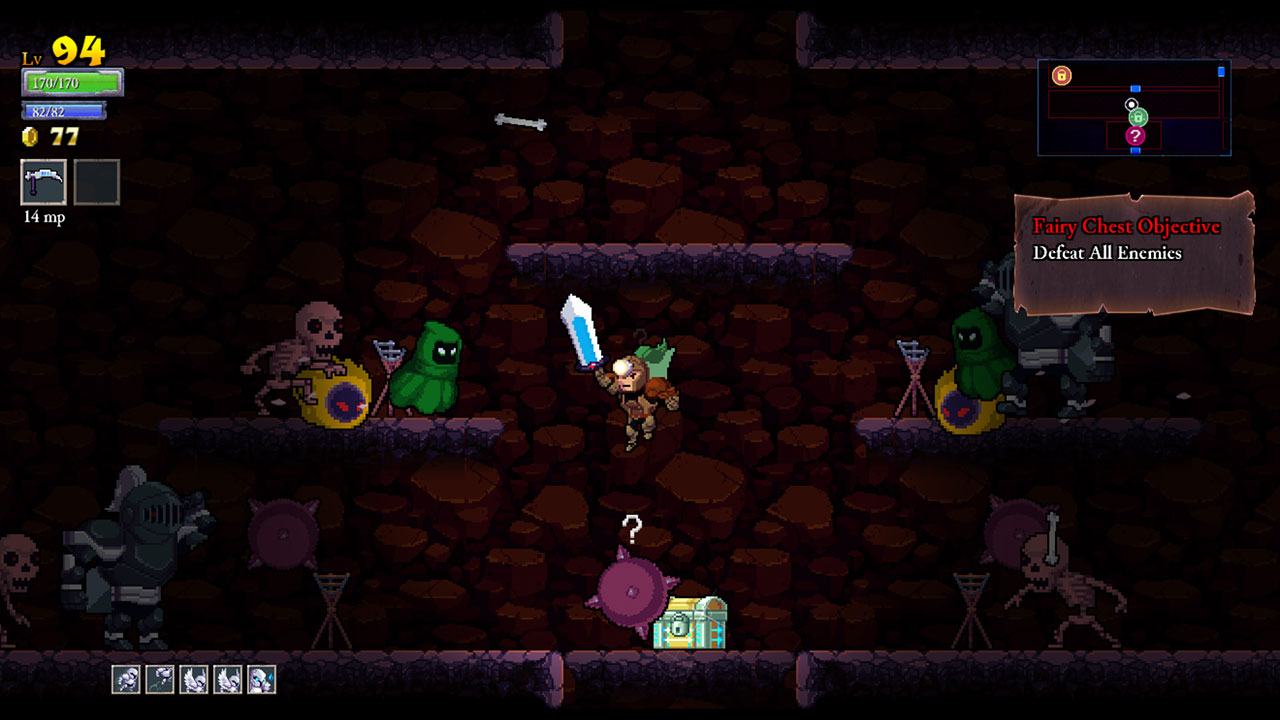
Now we’re really getting somewhere. Cellar Door Games is one of those fantastic companies that has managed to sustain for years on a single title, dumping time and resources into making it a better experience for players by and by. As it turns out, they’ve finally decided to invest in a second game, bringing it to PC and Switch in a simultaneous release that makes me salivate. However, they aren’t dumb, and have decided to bring their first, most famous game to the Switch at the exact same time. As they have identical embargo windows (and I received the games at the same time), I’m pleased to be reviewing both in an incredible tandem write-up that spans two articles. This first one here is all about their baby, the famous Rogue Legacy.
The plot line for Rogue Legacy boils down to a castle that is cursed to shuffle the rooms and contents therein for generation upon generation. There is a lineage of warriors who, for whatever reason, have taken it upon themselves to investigate the castle, deal with the monsters inside and figure out the reason and cure for this millennia old curse. The task is far from an easy one, however, as the five layers of the castle are incredibly complex, difficult and full of monsters, treasures and traps. Still, that’s where the old saying comes into play: if at first you don’t succeed, die and hope your kid will get it. That doesn’t make sense, but a lot about Rogue Legacy doesn’t and it doesn’t have to, so strap in, here we go.
Rogue Legacy is a procedurally generated exploration adventure game, tasking you with defeating the hidden bosses of the castle and restoring order. You absolutely cannot do this your first time through, as far as I can tell, so your purpose is to get as far as possible, collect as much gold as possible, and die without too much of a fuss. You’ll get booted back to the splash screen, where you will decide which of your heirs is going to take up the torch and continue the cause. Interestingly, this is where things get a bit murky, as the children of the previous hero miraculously keep all the attributes and bonuses that their parent had accumulated, plus the cash they found during their exploration. Each child will have another chance, getting stronger, gradually building up to a point where the hero that’s generated will be an absolute powerhouse in theory. I say in theory because this is where Rogue Legacy shows its chops and the brilliant insanity of the game.

Naturally, each child produced by the game is different, and it goes beyond sex and class type. The classes themselves start off simple enough (knight, mage and barbarian) and, through unlockables that are paid for with loot, create new class types (Shinobi, Lich, Miner) and even upgrade the older classes to new heights (mages become archmages, barbarians are barbarian kings/queens, etc.). The classes and their upgrades all have different skills and base stats, meaning that you can approach each run from a different direction. A miner, for example, cares not about combat but wants to get as much gold as possible before perishing. They also have the unique ability to see where some treasures might be (especially if you can upgrade them to spelunkers). The shinobi wants to get in that hit fast and hard, trading large amounts of HP for a good base damage multiplier. Basically you get a full D&D compendium of classes by the time you unlock everything in the “manor” (the skill tree where this all takes place).
But then there are quirks and traits that each child has that may or may not affect their quest. They might have glaucoma and have everything shrouded in a shadow. They may have ADHD and have some hyper running speed. Maybe they’re afflicted with gigantism or dwarfism, respectively, and have characters that tower or cower in effect. They might be gay, which doesn’t affect anything as far as I can tell but was an interesting trait to see rolled in every so often (affecting both males and females equally). The only trait that really bothered me was one where the child would have random muscle spasms, causing them to occasionally lock up in the middle of combat. This is an interesting enough ability, but it also caused the Joycons to buzz as hard as possible when it happened, which grew annoying very, very fast. I ended up killing myself in that run to put myself out of my misery. Note to Cellar Door Games: please add an option for vibration toggle.
So you get a bunch of different classes, with a ton of traits, the ability to build equipment if you find the blueprints, and then you’ll be able to enchant each piece with a different spell if you can find them and afford their one-time unlocking fee. This game is all about getting the loot, and Rogue Legacy does not disappoint in terms of making it interesting and compulsory to get the treasure in each run. Gold coins and bags of cash could be hiding anywhere destructible, from chandeliers and barrels to dropping from enemies themselves. There are treasure chests sprinkled throughout the game, often containing money but occasionally containing the aforementioned blueprints for equipment and enchantments. There are also fairy chests, which are chests that can only open if you meet certain conditions of the room (kill everything, don’t take damage, five seconds or less, etc.). Due to the procedurally generated nature of the game, these rooms are sometimes very easy to accomplish and occasionally fudging impossible unless you have the perfect character on task, like a miner with dwarfism who also has double jump. It’s a whole thing.

Rogue Legacy has a beautifully executed generation of the castle, taking almost no time to roll things up each incarnation in comparison to other procedurally generated games. This is probably due to some kind of beautiful algorithm that i don’t understand and don’t really need to, and probably also because Cellar Door Games has used the last five years since the initial release to polish it to a sheen. Every time you step into the game, you face a very real possibility of something that’ll cut you off at the knees before you take three steps. There are times when the game will toss you a bone and the first four rooms will have treasures and some mild enemies, and then sometimes the game decides you need to vault a ton of spikes and fireballs and just die so close to the exit your successors can see the blood fountain. If you get a castle combination that feels like you can do some real work, talk to the architect (an unlockable character), who will freeze the castle from re-rolling…for a price.
The one negative thing I have to say about Rogue Legacy is that it is a game that asks you to dedicate a lot of time and effort to make real progress. When I said that thing about four rooms and dead, that’s a perfectly honest description of more than a couple of my runs. Your initial entrance to the game is a brutal reality where you’ll only get about sixty gold for all your efforts, which might not unlock anything, and then you need to ditch all your cash between runs (like Immortal Redneck), thus preventing easy accumulation of funding to get stronger. Eventually (and I mean hours later) you’ll get strong enough to defeat the very first boss, who’ll seem fairly tame to anyone who’s managed to actually make it that far: just dodge and hit. You’ll get a ton of cash, and everything will seem hunky dory, and now you realize you need to go to the other parts of the castle. Spoiler: every other part (the forest, the Maya, the deep dungeons) are absolute hell in comparison to the main foyer, and you’ll be brutally killed. The result is that you need to purposely do a sweeping grind of the main castle for several times, building up cash to buff your characters, before you can successfully go more than a few rooms into the other areas. Then you’ll die from wolves, earth mages, Morningstar-swinging knights and God knows what else.
Yet I keep coming back to Rogue Legacy because the formula is just so damn good. It’s a fantastic adventure platformer, it rolls up so fast between runs, and the chance to get a character that I really want (a Hokage with ADHD and nothing visually negative) is always a possibility. I got to a point where I could haggle with Charon and not lose ALL my money between runs, which instilled more confidence. It’s a roguelike dream, as there is progression, you can see yourself getting better, and, theoretically, there is an end, it’s just way, WAY off in the distance. Best of all, this game makes perfect sense to be on the portable Switch, allowing you to do your runs on the go instead of being tethered to home. Of course, this substantially increases the chance of students and employees trying to win back their family’s fortunes while they should be doing something else, but that’s a risk we’re all willing to take.
REVIEW CODE: A complimentary Nintendo Switch code was provided to Bonus Stage for this review. Please send all review code enquiries to press@4gn.co.uk.
Subscribe to our mailing list
Get the latest game reviews, news, features, and more straight to your inbox
Thank you for subscribing to Bonus Stage.
Something went wrong.
Rogue Legacy Review
-
Gameplay - 9/10
9/10
-
Graphics - 9/10
9/10
-
Sound - 9/10
9/10
-
Replay Value - 9/10
9/10
User Review
( votes)Overall
Summary
Rogue Legacy is a potent mixture of great procedural generation, strong character development and a compelling reason to keep coming back for more punishment.






